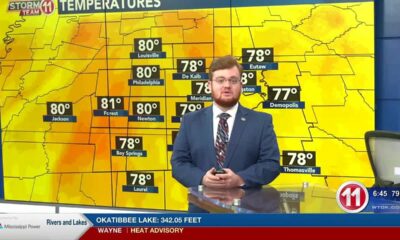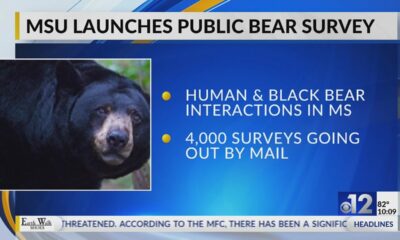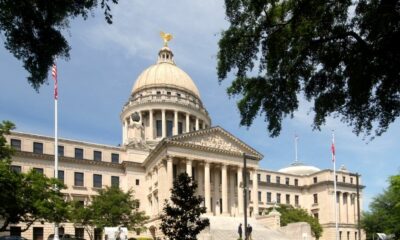Mississippi Today
Freedom Summer’s lasting impact: ‘They never forgot their mission’

Freedom Summer did more than change Mississippi. It changed America.
“So many of those volunteers went back to school with a new mission,” said Davis Houck, Florida State University's Fannie Lou Hamer professor of rhetorical studies. “They never forgot that mission.”
The seeds of the summer of 1964 changed voting in America. Changed political parties. Changed the nation.
That metamorphosis came not through some dramatic event captured on television, but through person-to-person relationships, said Dave Tell, the University of Kansas professor and author of “Remembering Emmett Till.” “It was a slower paced change, but in the end, it was a more powerful change.”
In 1964, civil rights leaders made public their plans to let student volunteers join them in working in the civil rights movement in Mississippi.
Upon hearing the news, Sam Bowers, imperial wizard for the White Knights of the Ku Klux Klan, told his fellow Klansmen to prepare for this “communist invasion.” “When the first waves of blacks hit our streets this summer,” they must avoid fighting them on the streets and attack them and their white collaborators at night, he said.
After darkness fell June 16, 1964, Klansmen heard that civil rights activists had gathered at Mount Zion Methodist Church in Neshoba County. They sped in their cars to the historically Black church and grabbed members, demanding to know where the activists were.

When members said they didn't know, Klansmen began to beat and pistol-whip members. Before Klansmen left, they torched the church.
“My mother had blood on her,” recalled member Jewel McDonald. “My brother had blood on him.”
Five days later, three young activists — James Chaney, Andrew Goodman and Michael Schwerner — came to investigate the Klan attack. Chaney and Schwerner had long been involved in the movement. Goodman had come as a Freedom Summer volunteer.
After spotting the trio, a deputy jailed them and released them that night into the hands of his fellow Klansmen, who killed the trio and buried their bodies 15 feet down in an earthen dam.
James Chaney never got to see his daughter, Angela Lewis, born 10 days before his death.
That's because he was on his way to Ohio to help train volunteers for Freedom Summer.
In the years that followed his killing, she didn't share the identity of her father, whose mother and family had been terrorized afterward.
During Black History Week in junior high, she followed other students into the library, where there were pictures on the wall of Martin Luther King Jr. and other civil rights activists. Then she saw it. A picture of her father.
“I never said a word,” she recalled. “I never told anyone.”
But each birthday carried a solemn reminder of the death of the father she never knew.
On the 40th anniversary of his death, she finally shared with others that her father was the civil rights icon, James Chaney.
“I love my dad and am so appreciative that he knew his purpose and assignment in life was to help others,” she said. “I am just like my dad.”
A year later in 2005, she wept as she watched a jury convict the Klan leader who helped orchestrate his killing, Edgar Ray Killen.
Young people need to be educated so that they can display the same passion and courage as her father's generation, she said. “Even with my dad, Andy and Mickey being killed, those students still got on the bus [for Freedom Summer in Mississippi].”

In June 1964, nearly 1,000 Freedom Summer volunteers, mostly white college students, arrived in Oxford, Ohio, for training.
They learned how to respond nonviolently to attacks from mobs and police. They learned how to run Freedom Schools to help educate children. They learned how to go door to door to encourage Black Mississippians to register to vote.
These white volunteers stayed with Black families, went to church with them and followed their house rules, Houck said. “It was a deeply immersive experience.”
Through that summer, volunteers came to understand what life was like for these Black families in Mississippi, he said. In turn, these families, who had never had white people under their roofs, now felt the burden of protecting them, he said.
Freedom Summer altered the trajectories of all of their lives, he said. “The movement changed them.”
Schwerner's widow, Rita Bender, said Freedom Summer's overarching lesson is that “if people organize themselves, they can collectively effect significant change in society.”
In that summer of 1964, the civil rights movement shone a light on Mississippi, which had done its best to keep Black voters from the polls after the Civil War ended, first with violence and then with laws and a new state constitution.
“There is no use to equivocate or lie about the matter,” future Gov. James K. Vardaman declared, “Mississippi's constitutional convention of 1890 was held for no other purpose than to eliminate the n—– from politics.”
Two years later, lawmakers purged all names from the voting rolls and barred Black voters from re-registering through poll taxes and constitutional quizzes.
The changes worked. Within a decade, the number of Black registered voters fell from more than 130,000 to less than 1,300.
Even after the passage of more than 70 years, that number remained miniscule. By 1964, less than 7% of Black Mississippians could vote.
That began to change with the passage of the Voting Rights Act of 1965, which Congress adopted in part because of the trio's murders and similar violence.
“Today, the hard-fought right to vote is under sustained attack,” Bender said. “Tragically, the gains of the past are not being utilized by many.”
Since 2023, at least 20 states, including Mississippi, have passed laws that make voting more difficult, according to the Brennan Center for Justice.
Under current Mississippi law, if voters fail to respond to a “confirmation notice” of their address, they are purged from the voting rolls.
In 2023, U.S. District Judge Henry T. Wingate blocked a law that he concluded might criminalize assistance to disabled Mississippians that might need help with absentee voting. This year, the state Legislature passed a measure to correct the law.
Mississippi also has the nation's strictest felony disenfranchisement law, barring more than 10% of the state's population from ever voting again because they've been convicted of certain felonies outlined in the constitution.
While some states, including Florida, have enabled those convicted of felonies to regain the right to vote, Mississippi has balked at such reform. That means more than 130,000 Black Mississippians, or 16% of the Black adult population, can't cast a ballot.
The Hill concluded that the second most difficult state in the nation to vote in was Mississippi.
Those in power “don't want ‘certain people' to vote,” said state Sen. John Horhn, a Democrat from Jackson. “It's a part of a bigger plan to maintain control, even as the white majority loses its numbers.”
Bender said a new movement — of the people, by the people and for the people — is needed to ensure that voting and other constitutional rights are protected.
As the nation diversifies, “there needs to be coalition building around extremely important common interests,” she said. “There is increasing resistance among some to this new reality as they feel threatened by these inevitable demographic changes.”
Goodman's brother, David, said that, for centuries, the notion was that authorities could do no wrong and must be obeyed, he said. “Back in King Henry's day, if you didn't accept the authority, you had your head chopped off.”
Those enslaved had to accept such authority or face possible death, he said. Afterward, they faced the horrors of Jim Crow, he said.

“My brother was murdered by people who viewed the imperial wizard as an authoritarian who should be listened to,” he said. “None of them were convicted of murder.”
Now, 60 years since Freedom Summer, “we're going back to the future,” he said. “We're dignifying the notion that an authoritarian can do no wrong.”
Throughout history, he said some of those in power have tried to deny or impede equal access to the ballot. For instance, student volunteers for the Andrew Goodman Foundation discovered a statewide ban on early in-person voting on Florida campuses.
“This ban of denying polling sites where young people lived, worked and studied had a negative impact on turnout,” Goodman said.
The foundation and the Florida League of Women Voters sued the state, and this in-person voting was restored.
On the 60th anniversary of the burning of Mount Zion Methodist Church, the church honored the slain trio in a service titled, “Rise From the Ashes.”
The Rev. Eddie Hinton, who serves as pastor for the church, said he sees people of different races coming together now.
“We have come a long way, but we still have a long way to go,” he said. “Black and white can work together.”
Mount Zion also honored McDonald and her family for their courage.
She told Mississippi Today that she has forgiven the Klansmen who attacked her family.
“Why should I hate someone?” she asked. “I don't believe in holding grudges. Why should I carry that when I can just forgive them and go on and live my life?”

Some people may think she's crazy for saying that, she said, “but I do believe in order for us to go to heaven, we need to love each other and, if we see someone who needs help, then help them out.”
She called on Mississippians to start healthy conversations across racial lines. “There's too much hatred,” she said. “We need to get rid of that hatred and love each other.”
This article first appeared on Mississippi Today and is republished here under a Creative Commons license.
Mississippi Today
Mississippi judge blocks Biden attempt to ensure LGBTQ+ medical treatment
A federal judge in Mississippi has blocked enactment of a Biden administration rule designed to prevent medical care from being denied to those seeking treatment related to gender identity or sexual orientation.
The lawsuit U.S. Southern District Judge Louis Guirola Jr. ruled on Wednesday was filed by 15 states, including Mississippi. But he said his injunction preventing the Biden administration from enforcing its rule would apply nationwide. His ruling is likely to be appealed.
On social media, the Human Rights Campaign proclaimed, “This is not over. All LGBTQ+ people should receive the health care we deserve and be able to make informed decisions about our own bodies.”
The Biden administration rule enacted earlier this year is designed to ensure those seeking medical care on the basis of gender identity or sexual orientation are not subject to discrimination. The rule is supposed to cover entities receiving federal funds for the delivery of health care.
The states argued against being forced to provide gender-affirming care through Medicaid programs or through health plans for state employees. In addition, the states argued against private insurance companies being required to provide such care.
“Injecting gender identity into our state's medical system is a dangerous pursuit of a political agenda from the Biden Administration,” Mississippi Attorney Lynn Fitch said in a statement. “Medical professionals should not be forced to provide gender transition surgeries or drugs against their judgment and hospitals should not be prohibited from providing women-only spaces for patients. I am proud to lead the multistate effort with Tennessee Attorney General Jonathan Skrmetti to stop the Biden Administration and push back on this reckless rule.”
The lawsuit is one of many filed by attorneys general and others objecting to the Biden administration interpreting Title IX to apply to banning discrimination based on sexual orientation and sexual identity. Congress passed, and President Richard Nixon signed into law, Title IX in 1972 to ban sexual discrimination.
In response to one of the similar lawsuits ruled on earlier in Louisiana, Kelley Robinson, president of the Human Rights Campaign, said, “Every student … deserves to be safe. Every young person deserves protection from bullying, misgendering and abuse.”
Robinson added, referring to the earlier court ruling, “This is MAGA theatrics with the dangerous goal of weaving discrimination into state law.”
Mississippi has passed a state law prohibiting minors from receiving gender-affirming care even if it is recommended by physicians.
On social media, Gov. Tate Reeves said, “The Biden Administration attempted to undermine Title IX by dramatically reinterpreting its meaning to now apply to gender identity. Thankfully, a federal court judge has sided with Mississippi and other states who chose to stand up for women and defend Title IX as it currently exists.”
The lawsuit filed by Fitch and other attorneys general argued that their states could be penalized by the loss of federal Medicaid funds, for example, if they did not adhere to the rule.
In blocking the rule. Guirola cited the Chevron case where the U.S. Supreme Court recently said that federal agencies should not be given deference in their rules-making.
This article first appeared on Mississippi Today and is republished here under a Creative Commons license.
Mississippi Today
State GOP plans to endorse judicial candidates, while Democratic Party does not

The leaders of the Mississippi's two major political parties recently offered two opposing plans for how much they plan to interact with candidates competing for one the state's three contested races for the state Court of Appeals and the state Supreme Court.
Mississippi Republican Party Chairman Mike Hurst told Mississippi Today on the June 24 edition of Mississippi Today's “The Other Side” podcast that the GOP will likely endorse certain candidates in the race, while Mississippi Democratic Party Chairman Cheikh Taylor said on the July 1 episode of the podcast that judicial endorsements are not on the party's radar.
Judicial elections tend to be low-interest races, but the elections this year will take place on the same ballot as the presidential and congressional elections. If a major political party endorses a candidate, it could give them more name recognition at the ballot box.
“I know it's a nonpartisan race, and I think there should be a clear dividing line between the campaigns for nonpartisan races and the partisan entities like the Republican Party,” Hurst said. “But at the same time, we all know that there are differences that judicial candidates hold in their opinions on how to interpret the constitution and how to interpret statutes.”
Candidates for the Mississippi Court of Appeals and the Mississippi Supreme Court are required to run as nonpartisan, meaning they do not run in a party primary. However, political parties can still endorse candidates running for those offices.
For a few years, state law banned parties from endorsing or donating money to nonpartisan judicial candidates. But the state GOP in 2002 filed a federal lawsuit challenging the ban. U.S. District Judge Henry T. Wingate struck down the ban as unconstitutional, saying it was a violation of the U.S. Constitution's First Amendment.
Taylor, who just won election to a full term as Democratic Party chairman, said the party is still in a “rebuilding phase” and has to carefully decide which races it should get involved with.
“There are so many races to get involved in and so many ways that funding is limited,” Taylor said. “We are structuring now to broaden our base to make sure that fundraising is not an issue moving forward.”
There are three contested judicial races this year: an open seat on the Mississippi Court of Appeals and two Mississippi Supreme Court races where incumbents face challengers.
In the Central District race for the Supreme Court, longtime incumbent Justice Jim Kitchens, a senior member of the Court, faces a challenge from four candidates: Abby Robinson, Ceola James, Byron Carter and Jenifer Branning. In the Southern District race, incumbent Justice Dawn Beam faces a challenge from David Sullivan.
Three people are competing for an open Court of Appeals seat: Jennifer Schloegel, Amy Lassiter St. Pe and Ian Baker.
All candidates will appear on the Nov. 5 general election ballot. If a candidate does not receive a majority of the votes cast, the two candidates who received the most votes will advance to a runoff election on Nov. 26.
This article first appeared on Mississippi Today and is republished here under a Creative Commons license.
Mississippi Today
Federal judges order Mississippi Legislature to create more Black districts, may prompt 2024 elections
The Mississippi Legislature has been ordered to create more Black-majority House and Senate Districts by a federal three-judge panel.
“The court rightly held that the Mississippi Legislature used the redistricting process to dilute the power of Black voters. Those legislative districts denied Black Mississippians an equal voice in state government,” said Jarvis Dortch, executive director of the ACLU of Mississippi.
The judges ruled in a lawsuit filed on behalf of the Mississippi Conference of the NAACP and Black voters from across the state that the districts that were drawn in 2022 by the state Legislature diluted Black voting strength. Legislative redistricting occurs every 10 yeas after the federal census.
In the ruling, released late Tuesday, the federal panel said it would give the Legislature the opportunity to redraw the districts, but added, “It is the desire of this court to have new legislators elected before the 2025 legislative session convenes, but the parties can make whatever arguments about timing they conclude are valid.”
The state, which opposed the lawsuit, can argue for more time to redraw the districts. Or the state could appeal the ruling to the U.S. Supreme Court.
MaryAsa Lee, a spokesperson for Republican Attorney General Lynn Fitch's office, said the agency is currently reviewing the court's opinion. She did not say whether Fitch wanted to appeal the order.
The federal panel did not accept all of the arguments of the NAACP and other plaintiffs. But the panel ruled that Black-majority Senate districts should be drawn at least in the DeSoto County area in north Mississippi and in the Hattiesburg area in south Mississippi. In addition, a new Black majority House district should be drawn in the Chickasaw County area in northeast Mississippi.
The state has a Black population of about 38%. Currently there are 42-Black majority districts in the 122-member House and 15 Black majority districts in the 52-seat Senate.
Multiple groups represented the NAACP and other plaintiffs in the case.
The three judges serving on the panel were all appointed by Republican President George W. Bush.
Charles Taylor, executive director of the Mississippi State Conference of the NAACP, said he was pleased with the decision “although we wish the court had gone further.”
The NAACP and others argued the totality of the 2022 redistricting by the Legislature diluted Black voting strength. Groups argued by “packing” a large percentage of Black voters in a concentrated number of districts it deprived them from having an impact in other districts. The three judge panel did not accept the total argument of the plaintiffs.
But still, the people who brought the lawsuit maintained the decision of the federal panel was a victory for Black Mississippians.
“This ruling brings us much closer to the goal of ensuring that Mississippi has a fair number of majority-Black legislative districts to go along with the majority-white ones,” said Rob McDuff, an attorney with the Mississippi Center for Justice.
READ MORE: Lawsuit claiming Mississippi Supreme Court districts are discriminatory is set for August
The Lawyers' Committee for Civil Rights Under Law, the American Civil Liberties Union, ACLU of Mississippi, the law firm of Morgan, Lewis & Bockius, Mississippi Center for Justice and civil rights attorney Carroll Rhodes all participated in the case.
“This ruling affirms that the voices of Black Mississippians matter and should be reflected in the state Legislature,” said Jennifer Nwachukwu, of the Lawyers' Committee for Civil Rights Under Law Voting Rights Project.
The next step will be for either the state to appeal or present arguments to the federal panel on why the new districts should not be drawn and filled via election before the 2025 legislative session.
This article first appeared on Mississippi Today and is republished here under a Creative Commons license.
-
Mississippi News6 days ago
Pearl under boil water notice due to E. coli
-
Mississippi News7 days ago
Tropical wave has a 70 percent chance of developing, National Hurricane Center says
-
Mississippi Business7 days ago
Communities qualify for Welcome Home Mississippi recertification
-
Our Mississippi Home7 days ago
Mississippi State’s UTC Staff Win Seven Emmy Awards
-
SuperTalk FM6 days ago
Move over 662, a new area code is coming to north Mississippi
-
Our Mississippi Home7 days ago
Celebrating the 15th Season of Festival South
-
Kaiser Health News7 days ago
Supreme Court Upends Purdue Pharma Opioid Settlement
-
Mississippi News6 days ago
Youth Court Judge says there is a dire need for foster homes – Home – WCBI TV



































